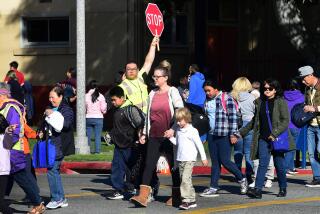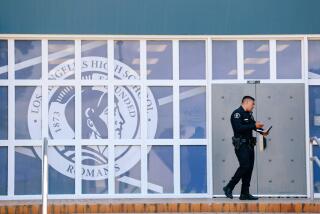Safety inside, outside the car
- Share via
Keeping your kids safe on their way to school is critical -- whether you’re ferrying them to first grade or proudly sending your teen off to college in a car.
The Automobile Club of Southern California warns that children and parents need to be vigilant in keeping students safe as this school year begins.
“The hectic back-to-school season finds many drivers, including parents, driving unsafely around school zones,” says Anita Lorz, traffic safety specialist at the auto club.
“Recent studies indicate that as many as two-thirds of drivers speed in school zones,” Lorz says.
To help parents and students brush up on safety issues, here are tips from auto safety and child safety experts:
* Whether you carpool or drive your children solo, youngsters must be restrained in age-appropriate safety seats.
* If carpooling with other families, establish safety rules and make sure all drivers agree to follow them.
* Insist that carpool motorists drive without distractions. Don’t use cellphones, eat, apply makeup or do anything else that would take attention off the road and compromise your driving responsibility.
* Obey school zone speed limits. Drive slowly in and around residential neighborhoods. Do not stop your vehicle in the middle of the street to drop off youngsters. Teach children to use a crosswalk if available and obey school crosswalk guards.
* Children under 10 should not cross busy streets alone. Watch for children around parked cars and be careful backing out of school parking lots. Stop for school buses loading and unloading.
Experts also advise that parents insist that children behave properly in a vehicle.
“If a child starts acting up, pull over to the side of the road,” says Dr. Elana ben-Joseph, a pediatrician and fellow at the Nemours Center for Children’s Health Media. Too many accidents occur when parents try to deal with upset or unruly children in the back seat, she says.
Janette Fennell, founder and president of the safety-advocacy group Kids and Cars, has suggestions for helping prevent accidents when a driver is backing up. Parents should consider “installing cross-view mirrors, audible collision detectors, a rear-view video camera and/or some type of backup detection device,” she says. At least 70 children have been killed in such accidents this year alone, Fennell says.
A monitoring bracelet called ionKids allows adults to locate and keep tabs on youngsters, outside or inside. If parents can’t readily find their child waiting to be picked up, the device could help pinpoint the youngster’s location, according to Bill Cummings, president of Bluespan Inc.
The child wears a bracelet that transmits a signal to a base unit held by the parents. The signal range is 300 feet or more outdoors and up to 200 feet indoors. Starter kits sell for $199.95, on www.familysafetyfirst.com.
Other devices on the market can help make the ride more comfortable and productive. To help children get an early start on their homework after school, Learning Express markets a personalized Lap Tray for kids, designed for doing homework on the go. Children can complete some of their school work while riding in the car. It’s a plastic, over-the-lap tray that makes it easy to write on and has pockets to store supplies, and is available at www.learningexpress.com.
If keeping your family vehicle clean is difficult, try Puff N Stuff Litterbags, which are leak-proof and hold two gallons of trash ($14.95, by One Step Ahead, www.onestepahead.com). The website also features seat protectors to keep seats free of dirt and scuff marks from muddy shoes after a tough soccer game. A set of two sells for $9.95. Another item is the Taby Tray, a portable tray to help kids eat safely on the go ($19.95).
Though many families turn to onboard video technology to entertain children, Ben-Joseph reminds parents that the American Academy of Pediatrics does not recommend television viewing for children ages 2 and under.
As for college-bound students, they should check their school’s policies on bringing a vehicle on campus. Some colleges discourage students having a car because of a shortage of parking, says Elaine Beno, auto club spokeswoman.
When purchasing a car for a college student, it’s important for parents to check out insurance costs, as well as discounts for drivers with good grades, Beno says.
She recommends not putting a student in a large SUV because it can be more difficult for young drivers to handle safely. In addition, having a vehicle that holds a large number of passengers can lead to driver distraction.
Jeanne Wright can be reached at jeanrite@aol.com.






